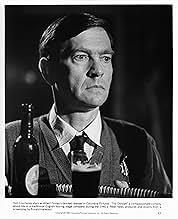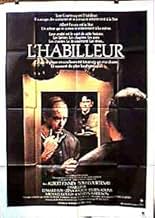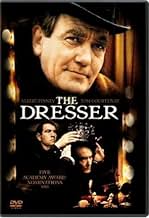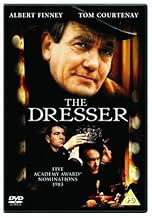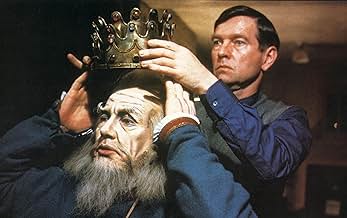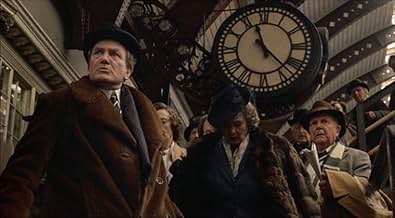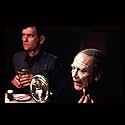Agrega una trama en tu idiomaPersonal assistant Norman struggles to get deteriorating veteran actor Sir through a difficult performance of King Lear.Personal assistant Norman struggles to get deteriorating veteran actor Sir through a difficult performance of King Lear.Personal assistant Norman struggles to get deteriorating veteran actor Sir through a difficult performance of King Lear.
- Nominado a 5 premios Óscar
- 5 premios ganados y 17 nominaciones en total
Anne Blackman
- Beryl
- (as Anne Mannion)
Opiniones destacadas
"The Dresser" is a small but absolutely wonderful film, brilliantly acted by Albert Finney and Tom Courtenay. How in the world this tiny film attracted enough attention to garner five major Academy Award nominations back in 1983 is a mystery to me, but it's nice to know the Academy can be guilty of a display of good taste every once in a while (of course, they gave the award that year to "Terms of Endearment"-- after all, they don't want to be accused of showing TOO much taste).
Albert Finney is a drunken Shakespearean actor in a production of "King Lear"; Tom Courtenay is the man who works double time behind the scenes to keep this actor in front of the footlights. It's both hilarious and piteous to see Courtenay's character showering Finney's with attention and affection, only to see his efforts utterly unappreciated and dismissed, even up to the very bitter end. Finney and Courtenay work wonders together, and though Finney gets the showiest moments (he does get to recite Shakespeare after all), Courtenay is the heart and soul of the film.
Grade: A
Albert Finney is a drunken Shakespearean actor in a production of "King Lear"; Tom Courtenay is the man who works double time behind the scenes to keep this actor in front of the footlights. It's both hilarious and piteous to see Courtenay's character showering Finney's with attention and affection, only to see his efforts utterly unappreciated and dismissed, even up to the very bitter end. Finney and Courtenay work wonders together, and though Finney gets the showiest moments (he does get to recite Shakespeare after all), Courtenay is the heart and soul of the film.
Grade: A
Adapted by a 1981 Broadway sensation, its film counterpart is a hidden treasure of its time (although it achieved 5 nominations in the Oscar including BEST PICTURE, BEST DIRECTOR, BEST ACTORX2 and BEST ADAPTED SCREENPLAY) but has been rarely mentioned and seen by a younger generation, I have no idea of its existence until recently. I feel kind of cherished to have a chance to watch this UK production since the play-in-a-play structure generally is my cup of tea.
Then it proves that this is an exceedingly diverting film from the late director Peter Yates even though the quintessence of pleasure may lie in Finney and Courtenay's crack two-hander, which is beyond any thespian methods, two utterly gallant performances brilliantly deliver every tiny little nuance and never descend into a stasis of tedious affectation. Theatrical adaption has always been an impeccable showcase for actors. A copybook triumph from both Finney and Courtney. The King Lear play in the film proffers a tour-de-force stage for Finney's expertise and his overpowering sway is both intimidating and entertaining; as for Courtenay, whose character molding even merits more pluck due to the self-challenging devoutness. Which one I prefer, after some contemplative thinking, despite of Finney's pretty fierce endeavor, I will choose Courtenay, a lesser known actor but achieves a more startling reverberation.
Among the supporting roles, Eileen Atkins is managing to steal some flare from two leading players, she is so underrated and should be ranked alongside Maggie Smith, Judi Dench and Helen Mirren, among the most venerated names inside the so-called UK Dame coterie.
The film has set up a perfect mode for the contemporary play-goes-film trend, within some minimal usage of settings, the impact has been magnified in an index level to be seen by a much larger audience. The screenplay is the keystone here, that's why they're emerging in an inexhaustible tide which verifies that theatrical play is an endless fodder-provider for both awards-craving production companies and thespians.
Then it proves that this is an exceedingly diverting film from the late director Peter Yates even though the quintessence of pleasure may lie in Finney and Courtenay's crack two-hander, which is beyond any thespian methods, two utterly gallant performances brilliantly deliver every tiny little nuance and never descend into a stasis of tedious affectation. Theatrical adaption has always been an impeccable showcase for actors. A copybook triumph from both Finney and Courtney. The King Lear play in the film proffers a tour-de-force stage for Finney's expertise and his overpowering sway is both intimidating and entertaining; as for Courtenay, whose character molding even merits more pluck due to the self-challenging devoutness. Which one I prefer, after some contemplative thinking, despite of Finney's pretty fierce endeavor, I will choose Courtenay, a lesser known actor but achieves a more startling reverberation.
Among the supporting roles, Eileen Atkins is managing to steal some flare from two leading players, she is so underrated and should be ranked alongside Maggie Smith, Judi Dench and Helen Mirren, among the most venerated names inside the so-called UK Dame coterie.
The film has set up a perfect mode for the contemporary play-goes-film trend, within some minimal usage of settings, the impact has been magnified in an index level to be seen by a much larger audience. The screenplay is the keystone here, that's why they're emerging in an inexhaustible tide which verifies that theatrical play is an endless fodder-provider for both awards-craving production companies and thespians.
Based on Harwood's successful play of 1980, THE DRESSER details the relationship between "Sir" (Albert Finney), an actor/manager of the old school and Norman, his dresser (Tom Courtenay).
Set largely in and around the streets of Bradford, Yorkshire, Peter Yates' film offers a vivid recreation of performing Shakespeare during an air-raid, when the actors had to announce to the audience that they would continue the play, despite the risk of being hit by a stray bomb. To a man and a woman, the audience stay put to enjoy "Sir" playing King Lear; this was precisely what happened in most theaters. Yates captures the cramped backstage conditions in a Victorian theater (part of the No.1 touring circuit); the dressing- rooms shared by most of "Sir"'s company, and the cramped wings where the actors waited for their entrances and exits, while the backstage staff (such as they were) had to provide the sound-effects using primitive materials such as a kettledrum, a wind-machine and a thunder sheet. With little or no real opportunity to purchase new things, the company have to make do and mend: for example, purchasing cornflour to use as impromptu make-up for their Shakespearean repertoire.
Based partly on the experiences of Donald Wolfit - who was not a 'ham' actor (as some reviewers have suggested), but a performer of the old school - THE DRESSER shows "Sir's" dedication to continue touring, despite being manifestly unable to do so. Tormented by the ghosts of actors past, he believes that he can no longer give of his best; the only way he can be patched up to go onstage is through Norman's continual promptings. Finney captures the monstrous egotism of the man - who can be downright cruel to his fellow-actors yet in the next moment behave like a baby needing comfort from his carers. "Sir's" acting-style can best be described as full-on, complete with extravagant gestures and meaningful pauses. It might seem exaggerated to modern viewers, but to wartime audiences in England his productions provided much-needed respite from the strains of having to survive. The production design (by Stephen Grimes) owes a lot to Wolfit's inspiration; "Sir's" costume as Lear, and the settings are both based on the designs used in the actor/manager's stage production, which played from 1943 to 1953.
As Norman, Tom Courtenay is a protean figure - at once solicitous, angry, kind, vain, jealous and loyal. His entire life revolves around "Sir"; however much he might object to his employer's behavior. At the end he is bereft, as Sir passes away, and Norman wrings his hands and wails "What am I going to do?" Like the loyal stage-manager Madge (Eileen Atkins), he has been working in this touring company for a long time with no real thanks; and the fact that his name has been omitted from Sir's dedication in the opening paragraph of his (unfinished) autobiography proves especially galling for the Dresser. On the other hand, both Norman and Madge emphasize the strong sense of loyalty that dominated the old touring companies; despite meager salaries, poor living-conditions and indifferent treatment from their employer, they refused to do anything else, in the belief they were part of "one big happy family."
The casting of minor roles in THE DRESSER has been carefully thought out. Lockwood West makes an endearing Geoffrey, an elderly actor pitchforked into playing the role of Lear's Fool, although manifestly unsuited to the role. His equally elderly colleague Horace Brown is played by Llewellyn Rees, whose previous employment included a spell as Donald Wolfit's company manager in the early Fifties. Edward Fox turns in a malicious performance as Oxenby, a lame actor with a barely-suppressed hatred for Sir's authority.
Although three decades old, THE DRESSER remains a highly entertaining piece, as well as being a valuable recreation of an important moment in British theatrical history which remains comparatively neglected by scholars.
Set largely in and around the streets of Bradford, Yorkshire, Peter Yates' film offers a vivid recreation of performing Shakespeare during an air-raid, when the actors had to announce to the audience that they would continue the play, despite the risk of being hit by a stray bomb. To a man and a woman, the audience stay put to enjoy "Sir" playing King Lear; this was precisely what happened in most theaters. Yates captures the cramped backstage conditions in a Victorian theater (part of the No.1 touring circuit); the dressing- rooms shared by most of "Sir"'s company, and the cramped wings where the actors waited for their entrances and exits, while the backstage staff (such as they were) had to provide the sound-effects using primitive materials such as a kettledrum, a wind-machine and a thunder sheet. With little or no real opportunity to purchase new things, the company have to make do and mend: for example, purchasing cornflour to use as impromptu make-up for their Shakespearean repertoire.
Based partly on the experiences of Donald Wolfit - who was not a 'ham' actor (as some reviewers have suggested), but a performer of the old school - THE DRESSER shows "Sir's" dedication to continue touring, despite being manifestly unable to do so. Tormented by the ghosts of actors past, he believes that he can no longer give of his best; the only way he can be patched up to go onstage is through Norman's continual promptings. Finney captures the monstrous egotism of the man - who can be downright cruel to his fellow-actors yet in the next moment behave like a baby needing comfort from his carers. "Sir's" acting-style can best be described as full-on, complete with extravagant gestures and meaningful pauses. It might seem exaggerated to modern viewers, but to wartime audiences in England his productions provided much-needed respite from the strains of having to survive. The production design (by Stephen Grimes) owes a lot to Wolfit's inspiration; "Sir's" costume as Lear, and the settings are both based on the designs used in the actor/manager's stage production, which played from 1943 to 1953.
As Norman, Tom Courtenay is a protean figure - at once solicitous, angry, kind, vain, jealous and loyal. His entire life revolves around "Sir"; however much he might object to his employer's behavior. At the end he is bereft, as Sir passes away, and Norman wrings his hands and wails "What am I going to do?" Like the loyal stage-manager Madge (Eileen Atkins), he has been working in this touring company for a long time with no real thanks; and the fact that his name has been omitted from Sir's dedication in the opening paragraph of his (unfinished) autobiography proves especially galling for the Dresser. On the other hand, both Norman and Madge emphasize the strong sense of loyalty that dominated the old touring companies; despite meager salaries, poor living-conditions and indifferent treatment from their employer, they refused to do anything else, in the belief they were part of "one big happy family."
The casting of minor roles in THE DRESSER has been carefully thought out. Lockwood West makes an endearing Geoffrey, an elderly actor pitchforked into playing the role of Lear's Fool, although manifestly unsuited to the role. His equally elderly colleague Horace Brown is played by Llewellyn Rees, whose previous employment included a spell as Donald Wolfit's company manager in the early Fifties. Edward Fox turns in a malicious performance as Oxenby, a lame actor with a barely-suppressed hatred for Sir's authority.
Although three decades old, THE DRESSER remains a highly entertaining piece, as well as being a valuable recreation of an important moment in British theatrical history which remains comparatively neglected by scholars.
A fantastic cinema experience. I really enjoyed seeing this truly magnificent film in the theater when it came out. There is nothing to add, except that is a terrible shame that sir Albert Finney still isn't accepted by the AMPAS (American Academy). After roles in such films as Tom Jones, Murder on the Orient Express, Under the Volcano (to name only few - for these he was nominated for the Oscar), The Dresser is arguably his highlight, yet...
I know, Oscars are just a popularity contest, but if Americans like British actors and actresses ("and the Oscar goes to" Jeremy Irons, Daniel Day-Lewis, Anthony Hopkins, Emma Thompson, Glenda Jackson etc. - and they all deserved the award!), why they always left Sir Finney with empty hands?
On the other hand, they gave it to John Wayne and Marisa Tomei (in My Cousin Vinny). I don't know, should I laugh or cry?
If you have seen the two leads in The Dresser you won't forget what is the art of acting. Watch this film and enjoy! I recommend it to everyone who loves art.
I give 9/10 for this excellent film (1 point missing for non-cinematic material, after all it is "just" a filmed stage play).
Note: My rating criteria is much stricter than the one on IMDb (10 only for the Cinematic masterpiece that should/could last forever).
I know, Oscars are just a popularity contest, but if Americans like British actors and actresses ("and the Oscar goes to" Jeremy Irons, Daniel Day-Lewis, Anthony Hopkins, Emma Thompson, Glenda Jackson etc. - and they all deserved the award!), why they always left Sir Finney with empty hands?
On the other hand, they gave it to John Wayne and Marisa Tomei (in My Cousin Vinny). I don't know, should I laugh or cry?
If you have seen the two leads in The Dresser you won't forget what is the art of acting. Watch this film and enjoy! I recommend it to everyone who loves art.
I give 9/10 for this excellent film (1 point missing for non-cinematic material, after all it is "just" a filmed stage play).
Note: My rating criteria is much stricter than the one on IMDb (10 only for the Cinematic masterpiece that should/could last forever).
This is a movie that deserves another look--if you haven't seen it for a while, or a first look--if you were too young when it came out (1983). Based on a play by the same name, it is the story of an older actor who heads a touring Shakespearean repertory company in England during World War II. It deals with his stress of trying to perform a Shakespeare each night while facing problems such as bombed theaters and a company made up of older or physically handicapped actors--the young, able bodied ones being taken for military service. It also deals with his relationship with various members of his company, especially with his dresser. So far it all sounds rather dull but nothing could be further from the truth. While tragic overall, the story is told with a lot of humor and emotions run high throughout. The two male leads both received Oscar nominations for best actor and deservedly so. I strongly recommend this movie to anyone who enjoys human drama, theater--especially Shakespeare, or who has ever worked backstage in any capacity. The backstage goings-on make up another facet of the movie that will be fascinating to most viewers.
¿Sabías que…?
- TriviaRonald Harwood based his play "The Dresser", and this movie's subsequent screenplay, on the biography "Sir Donald Wolfit CBE: His life and work in the Unfashionable Theatre", and on his own experiences as an actor and dresser for renowned Shakespearian actor Donald Wolfit. Harwood's repertory ensemble, Shakespeare Company, frequently performed Shakespeare's plays, and Harwood was Wolfit's dresser between 1953 and 1958.
- ErroresAfter Sir and Norman leave the marketplace, they're passed by a Routemaster bus. These buses were first used in London in 1954, and weren't used outside London until the 1970's.
- ConexionesEdited into The Clock (2010)
- Bandas sonoras(We're Going To Hang Out) The Washing the Siegfried Line
(uncredited)
Music by Michael Carr
Lyrics by Jimmy Kennedy
Sung by Tom Courtenay (as Norman)
Selecciones populares
Inicia sesión para calificar y agrega a la lista de videos para obtener recomendaciones personalizadas
- How long is The Dresser?Con tecnología de Alexa
Detalles
- Fecha de lanzamiento
- País de origen
- Idioma
- También se conoce como
- The Dresser
- Locaciones de filmación
- Productoras
- Ver más créditos de la compañía en IMDbPro
Taquilla
- Presupuesto
- GBP 1,456,000 (estimado)
- Total en EE. UU. y Canadá
- USD 5,310,748
- Total a nivel mundial
- USD 5,310,748
Contribuir a esta página
Sugiere una edición o agrega el contenido que falta

Principales brechas de datos
By what name was El vestidor (1983) officially released in India in English?
Responda

